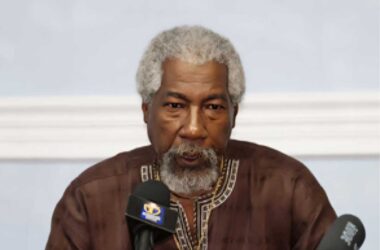
The current international order is at a crossroads and socialist countries in the developing world are working hand-in-hand and hand-in-glove with other nations outside their political and ideological orbit, to push for achievement of a goal promoted by the Caribbean decades ago: a New Global Human Order (NGHO) to pursue development of a multi-polar world, as proposed by Guyana’s President Dr Cheddi Jagan at the closing of the 20th Century and later adopted by the United Nations (UN) at the start of the 21st century.
And this aim was (again) of the underlying basis for the latest exchange between the top leaders of China and Cuba – the former with the world’s biggest communist party and the biggest developing country and the latter with the Caribbean’s biggest communist party and the only socialist country in the Western Hemisphere.
The November 23 meeting in Beijing between Presidents and Party Leaders Xi Jinping and Miguel Diaz-Canel Bermudez was followed by an 18-point joint statement on deepening China-Cuba relations in the new era, the two nations and parties mutually supporting each other’s respective positions on key global issues.
Cuba reiterated its firm position of “unconditionally abiding by the One China principle” and that Havana “firmly opposes any attempt to use the Taiwan question to interfere in China’s internal affairs.”
China reiterated its firm support for the Cuban people “in their just struggle to defend national sovereignty and oppose external interference and blockades” and for “ending the economic, commercial and financial embargo against Cuba.”
According to Cuban news agency Prensa Latina, President Diaz-Canel was accompanied by several senior officials, including Deputy Prime Ministers Ricardo Cabrisas and Alejandro Gil, Foreign Minister Bruno Rodriguez, Foreign Trade and Foreign Investment Minister Rodrigo Malmierca and Energy and Mines Minister Vicente de la O.
The Cuban leader’s visit came amid several to Beijing of late by leaders from other socialist countries, deepening exchanges in theory and practice, cooperation and mutual support, including by General Secretary of the Communist Party of Vietnam Central Committee Nguyen Phu Trong and President of Laos Thongloun Sisoulith.
The Cuban leader was the first Latin American and Caribbean Head of State received by China since the 20th National Congress of the Communist Party of China (CPC) in October, which, according to President Xi, “fully demonstrates the special friendship between the two countries and parties.”
He noted that “Cuba is the first country in the Western Hemisphere that established diplomatic relations with the People’s Republic of China” and “Our ties have become an example of solidarity and cooperation between socialist countries, as well as an example of sincere mutual assistance between developing countries.”
Li Haidong, a professor at the Institute of International Relations at the China Foreign Affairs University, told Global Times the “special friendship” mentioned by President Xi was “embodied in the long-term friendship of the two socialist countries since they established diplomatic ties.”
He added, “The two sides enjoy a friendship forged by the older generation of leaders, which has become a precious legacy of the two countries that should be cherished and consolidated.”
Han Han, Secretary General of the Center for the Cuba Studies Institute of Latin American Studies under the Chinese Academy of Social Science, told Global Times, “China and Cuba have always maintained frequent and consistent bilateral exchanges between the leaders and the two ruling parties,” which is “key to promoting China-Cuba ties, as well as ensuring policy coherence and smooth implementation of pragmatic cooperation under the BRI.”
She added that “Cuba is a bellwether country in Latin America and the spiritual vanguard of the left,” and “is a model of independence and self-reliance in Latin America.”
To date, about two-thirds of Latin American countries have elected leftist governments and strengthening ties with China (the latest being Argentina, Brazil, Chile and Colombia in 2021), which has also allowed them to make strategic choices and boost their independence and confidence as developing nations.
“China-Latin America economic and trade cooperation has overcome the adverse impact of the pandemic, showing strong resilience and development momentum,” says Shu Jueting, spokesperson from China’s Ministry of Commerce (MOFCOM).
Wang Youming, Director of the Institute of Developing Countries at the China Institute of International Studies in Beijing, says “China’s cooperation with Latin America is based on mutual respect and benefit that local people welcome, and does not target any third party.”
Han says, “Energy prices have continued to rise with increasing global demand, posing a great challenge to Caribbean countries like Cuba that depend greatly on external energy supplies.”
She also says, “Improving energy supplies, building power plants and more infrastructure are crucial for Cuba to realize its development goals, and in these fields, China and Cuba could strengthen their win-win cooperation.”
Naturally, little of this has made news headlines in the mainstream international media, which has instead been concentrating on presenting the election of President Xi Jinping as General Secretary of the Communist Party of China (CPC) for a third consecutive time as some sort of mortal sin crying to the heavens for vengeance and China’s successful COVID-19 policy as punishment instead of precaution.
Earlier this week, lives lost in an unfortunate apartment building fire was somehow blamed externally on Beijing’s Zero-COVID policy, while the foreign press gave maximum coverage to minor skirmishes between police and small groups of protesters.
Then came news of the death of ex-President Jiang Zemin at 96, with the usual suspects in the foreign press openly engaging in wishful thinking, including that his death would influence a widening of the “rare protests” into a political campaign to force President Xi to step down, the CPC to step back – and both to relinquish the offices they were elected to.
But none of that is likely, as China and Cuba instead opt to work closer together to build new bridges of friendship between Beijing and Havana, in pursuit of a new global human order for the benefit of all.











